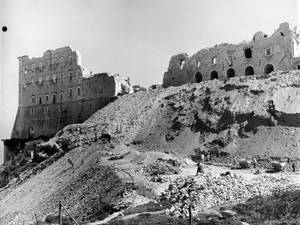
 T GIVES ME JOY to recall a visit I made many years ago in France to a Benedictine monastery whose monks were living the monastic life to the hilt—chanted solemn liturgy, a demanding horarium, fasting and abstinence, much study and lectio divina, manual labor, the whole nine yards. They were living, in essence, a life indistinguishable from that of the earliest monks, in the days when water wheels represented the height of technology, quite as if the modern world, with its ever-multiplying complexities and ever-deeper confusion, simply had nothing to say to them. And they were right: it could have only spoken to them at lurid length of the world, the flesh, and the devil, when they were seeking heaven, grace, and God. They did not have a need to be up to date, rushing around with all the other people rushing around in a frantic desire to be noticed, to be relevant, to be on the cutting edge. In reality, it is the world that so desperately needs these monks and their timelessness, prayer, and peace. By being utterly irrelevant and unnoticed in their daily round of song and silence, they came to possess a medicine that heals the victims of our times.
T GIVES ME JOY to recall a visit I made many years ago in France to a Benedictine monastery whose monks were living the monastic life to the hilt—chanted solemn liturgy, a demanding horarium, fasting and abstinence, much study and lectio divina, manual labor, the whole nine yards. They were living, in essence, a life indistinguishable from that of the earliest monks, in the days when water wheels represented the height of technology, quite as if the modern world, with its ever-multiplying complexities and ever-deeper confusion, simply had nothing to say to them. And they were right: it could have only spoken to them at lurid length of the world, the flesh, and the devil, when they were seeking heaven, grace, and God. They did not have a need to be up to date, rushing around with all the other people rushing around in a frantic desire to be noticed, to be relevant, to be on the cutting edge. In reality, it is the world that so desperately needs these monks and their timelessness, prayer, and peace. By being utterly irrelevant and unnoticed in their daily round of song and silence, they came to possess a medicine that heals the victims of our times.
As I participated from the sidelines in the life of these modern-day desert fathers, for whom the Eucharist was truly the font and apex of their entire being, I began to think and feel that the death of the traditional monastic life was probably, all things considered, the single worst thing that happened after the Second Vatican Council, even if it is not nearly as obvious or widespread as the general doctrinal, moral, and liturgical chaos and the ensuing wasteland. In monasteries and religious houses, observances going back for centuries were suddenly thrown off; habits were modified or discarded; the daily round of prayer was severely cut back or even replaced with novel practices; the Holy Mass lost its contemplative spirit and degraded itself in arbitrary and subjective experiments. Places that had been epicenters of devotion for towns, provinces, and countries could no longer offer thirsty laymen the concentration of prayer and purity of vision they longed for. Those who have seen the statistics know what happened: within a few years, the monastic life collapsed almost everywhere, as thousands gave up their vocations. Whole congregations and orders disappeared off the face of the earth.
Although a vastly larger number of the faithful were harmed by innovations and dissent at the parish and diocesan level, the loss of the fullness of Christian life as it is uniquely lived in convents and monasteries was a devastating blow struck to the very heart of the Mystical Body of Christ on earth. If prayer is the oxygen of the soul, as Padre Pio once said, the collapse of monastic life was like a deoxygenation of the blood and a weakening of the entire circulation throughout the body. It has often been said that the external and missionary vitality of the Church is in direct proportion to the vitality of the hidden contemplative life within her—one of the reasons a cloistered Carmelite, St. Thérèse of Lisieux, was declared co-patron of the missions with St. Francis Xavier.
We are fortunate to be alive right now in the very earliest preliminary phase of recovery, as the number of authentic monasteries of men and women very slowly grows by the mercy of God. May the Lord who loves the fruitfulness of the hidden life, the jewel of heavenly contemplation, the burning sun of interior righteousness, have mercy on us and save us, for He is gracious and loves mankind, and to Him we render glory, Father, Son, and Holy Spirit, now and always and for ever and ever, Amen.

Please visit THIS PAGE to learn more about Dr. Kwasniewski’s Sacred Choral Works and the audio CDs that contain recordings of the pieces.

